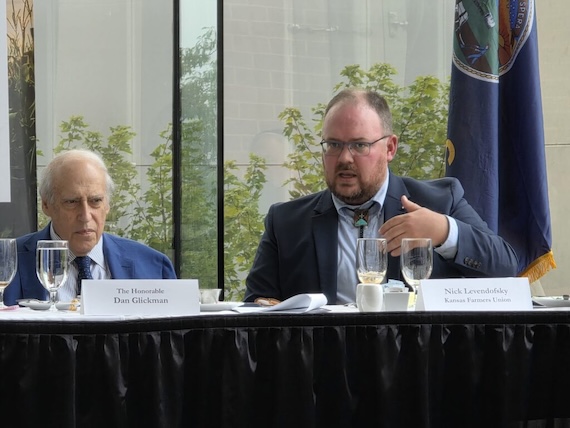by Anna Kaminski, Michigan Advance
TOPEKA — Collin Tuthill, president of one of the country’s largest canned and frozen food importers and distributors, said the current state of the U.S. food industry is “like we live in some kind of alternate universe.”
The most efficient industry is being hit the hardest by tariff policies and rising costs, he said Tuesday during a video call with reporters.
“The folks that are taking the punches are the ones that can’t really afford to take the punches,” said Tuthill, president of Royal Food Import, a North Carolina-based company that distributes food to hospitals, food banks, schools and prisons.
Tuthill was part of a group brought together by Tariffs Cost US, a campaign highlighting the detrimental effects of Trump administration tariff policies.
Nick Levendofsky, executive director of the Kansas Farmers Union, said costs were already rising — for consumers and farmers — before President Donald Trump implemented tariffs.
“With tariffs, they are going up more,” he said.
Families see the effects in the cost of their Thanksgiving meals, he said.
Tariffs on imported steel have increased the overall cost of canned goods. Cheeses, spices and chocolates also have become more expensive. The tariffs, which have reached the highest average rate since 1935, stack on top of higher fuel, seed, fertilizer, equipment and transportation costs, Levendofsky said.
Then farmers see an even smaller share of profits.
For a turkey that costs $2.40 per pound, a farmer receives 6 cents, Levendofsky said. For a $6.99, 8-pound bag of potatoes, farmers receive 94 cents. A $4.49, 18-ounce package of dinner rolls gets a farmer 9 cents. A 12-ounce bag of green beans sold for $2.49 earns a farmer 62 cents.
“So when we talk about tariffs, we’re not talking about an abstract policy. We’re talking about real price increases on the foods that make up a traditional Thanksgiving dinner,” Levendofsky said. “Every added cost in the supply chain eventually shows up at the checkout line.”
The bottom line, he said, is tariffs don’t protect families or farmers.
Mary Carroll Dodd, owner of Red Scout Farm in western North Carolina, grows crops to sell through community-supported agriculture, at farmers’ markets and to local restaurants. Many of the supplies she depends upon — greenhouse materials, potting soil, tools, insect netting and produce bags — come from Canada, Mexico and China.
Costs add up quickly and profit margins are thin, she said.
“Every increase means tough choices,” Dodd said.
That can include price hikes for customers or other cost-cutting measures, which often come at the expense of fair worker pay, she said.
Because of the increase in her farm’s costs, she has raised the price of collard greens, kale and lettuce mix bags.
“We should be making it easier for family farms to survive,” Dodd said, “not harder.”

Nick Levendofsky (right), executive director of the Kansas Farmers Union, asks a question of former U.S. Agriculture Secretary Dan Glickman during a U.S. Global Leadership Coalition meeting on Aug. 28, 2025, in Overland Park. (Photo by Morgan Chilson/Kansas Reflector).
The Trump administration has touted trade deals and proposed bailout payments to mitigate low crop prices and high production costs. The administration also has claimed Thanksgiving food prices are lower this year than in past years, which the panelists said was misleading and inaccurate.
“A bailout is a Band-Aid on a bullet wound,” Levendofsky said.
Policy shifts throughout the agriculture industry are needed, he said. Kansas has piles of sorghum that are growing by the minute, but there’s no market for the farmers that grow it, he said. Farmers also need antitrust law enforcement that targets massive companies that have outsized control of markets, particularly meatpackers, Levendofsky said.
“I can honestly say farmers don’t want a bailout,” he said. “They want trade, not aid.”
Dodd said farms need long-term, sustainable solutions that are not one-size-fits-all. Existing programs within the U.S. Department of Agriculture’s Natural Resources Conservation Service, such as its conservation stewardship program and cropshare programs, can provide farmers with sustainability.
Tuthill said a bailout is not going to solve farmers’ issues. The food industry needs customers outside of the country to draw dollars back into the country, he said.
For his company, tariffs and rising costs have meant fewer items going to food banks, smaller portions in school cafeterias and lower quality products in hospitals and prisons. Tariffs or taxes on food make no sense, he said.
“We’re at a pretty sad state of affairs to see that we’re raising the price of food for the most in need,” Tuthill said. “We see it every day.”
This story was originally produced by Kansas Reflector, which is part of States Newsroom, a nonprofit news network which includes Michigan Advance, and is supported by grants and a coalition of donors as a 501c(3) public charity.
Michigan Advance is part of States Newsroom, a nonprofit news network supported by grants and a coalition of donors as a 501c(3) public charity. Michigan Advance maintains editorial independence. Contact Editor Jon King for questions: info@michiganadvance.com.

 © 2026 All Rights Reserved
© 2026 All Rights Reserved